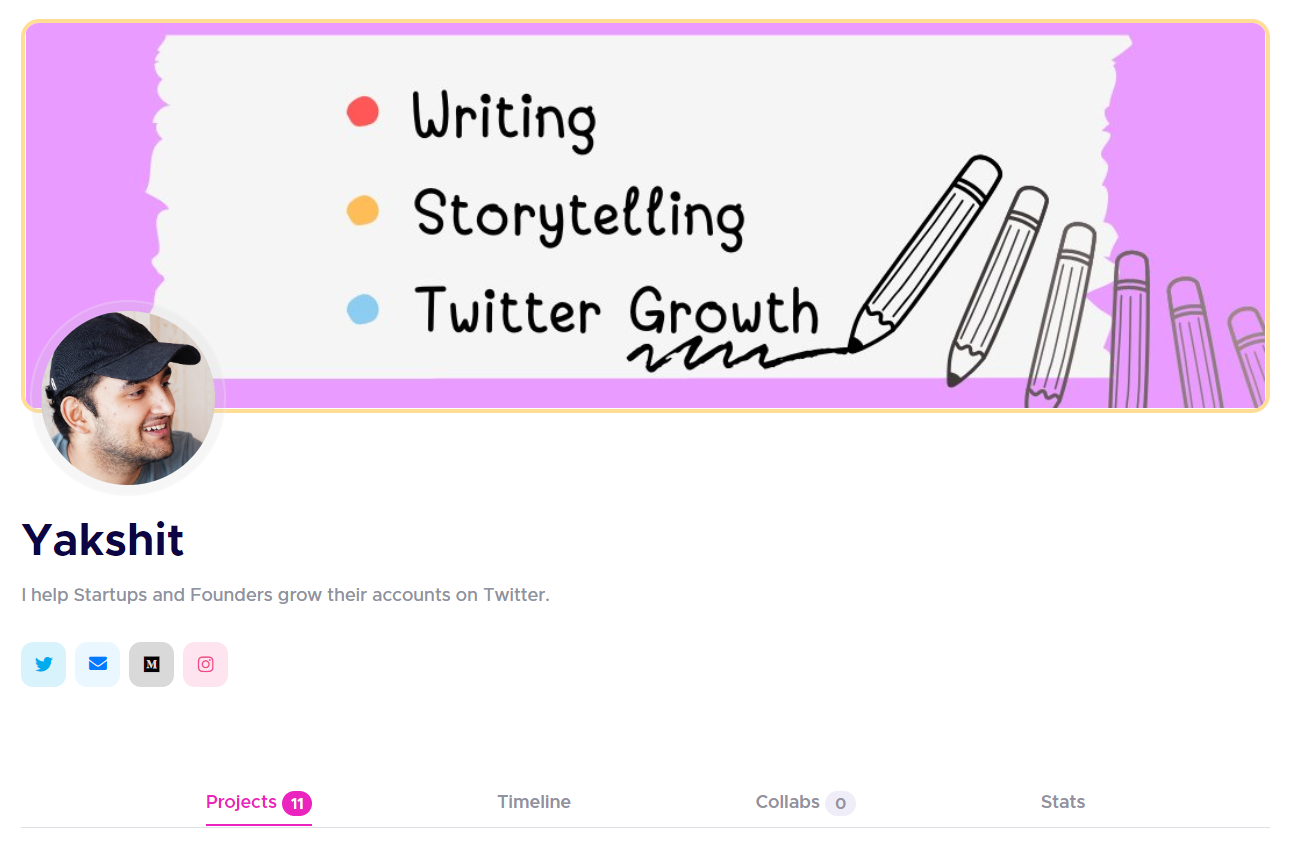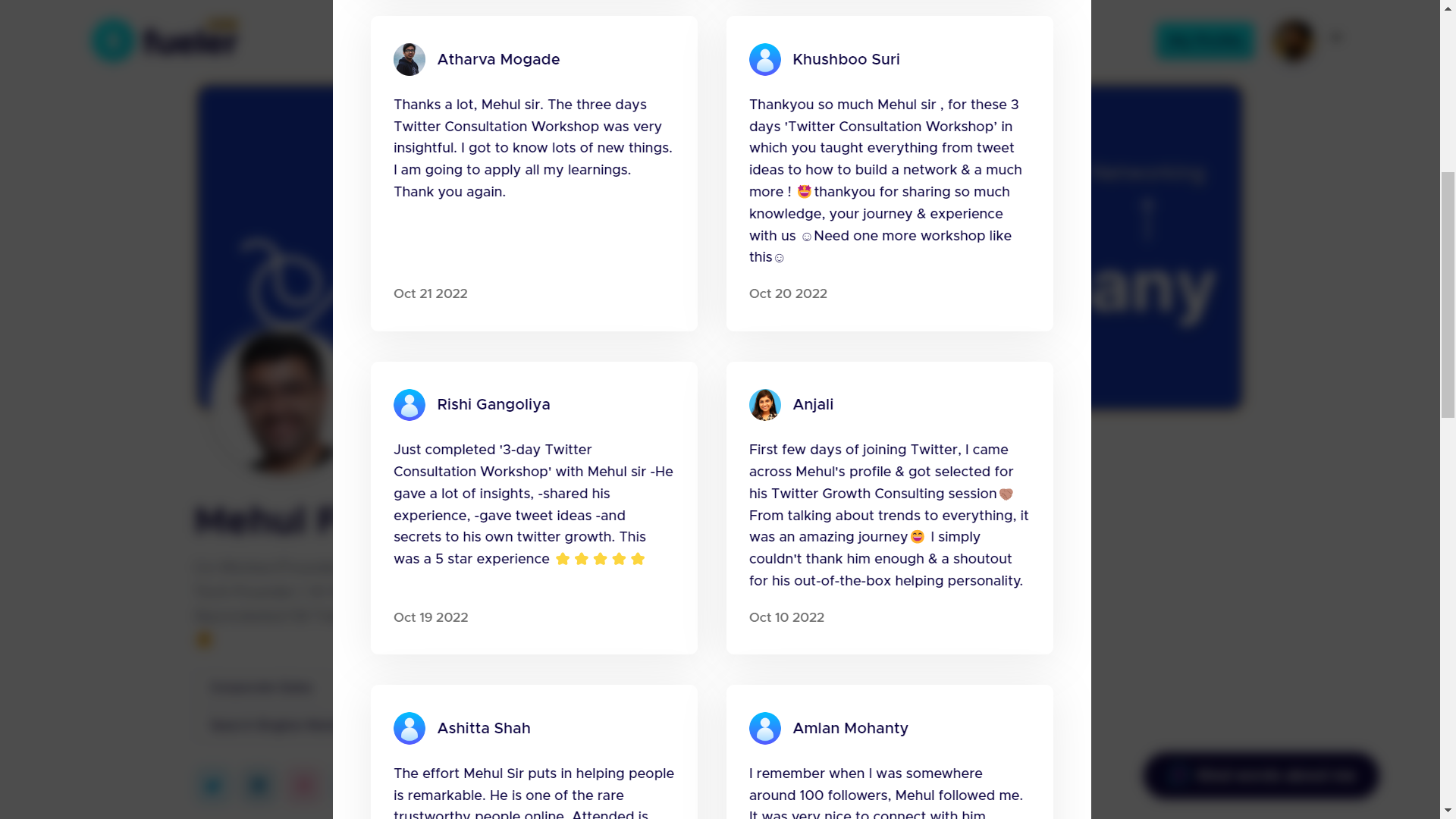How to Break into Freelance Ghostwriting?

Team Fueler
14 Dec, 2022

Ghostwriting is a common practice in which a writer creates content for someone else and is credited as a "ghostwriter" rather than the actual author.
Ghostwriting can be used for a variety of purposes, including to help those who lack writing skills or time, or to allow someone to remain anonymous as the content's author. Ghostwriting can be lucrative and there are many opportunities available, from writing novels to creating political speeches.
However, breaking into the industry and becoming a successful ghostwriter can be challenging. In this guide, we will cover all the information you need to know about starting a career in ghostwriting.
What is Ghostwriting?
Ghostwriting is similar to creating content, such as a book, article, or speech, for someone else to publish under their own name.
As a ghostwriter, you may be required to sign a nondisclosure agreement (NDA) and give up any intellectual property (IP) rights to the content you produce.
In exchange, you may be paid more than if you're credited as an author of the content. Ghostwriters typically work behind the scenes and the client presents the work as their own.
However, in some cases, a ghostwriter may be credited as a collaborator, usually when they are well-known in other areas, and being named as a collaborator could help increase the popularity or sales of the content.
Why there is a demand for Ghostwriter?
There are several reasons why individuals or organizations might choose to hire ghostwriters:
- Lack of writing skills or time: Some people may not have the writing skills or time to produce content themselves, and so they hire ghostwriters to create it for them. This can be especially useful for those who need to produce a large volume of content, such as a book or series of articles.
- Desire for anonymity: Some people may want to share their ideas or stories but may not want to be credited as the author of the content. In these cases, they may hire a ghostwriter to produce the content for them.
- Need for a professional touch: Some people may want to produce high-quality content but may not have the expertise or experience to do so on their own. They may hire a ghostwriter to ensure that the content meets their standards and effectively conveys their message.
- Need for specialized knowledge: Ghostwriters may have specialized knowledge or experience in a particular subject area, which can be valuable to clients who need content on that topic but do not have the necessary expertise themselves.
- Professional credibility: Some people may hire ghostwriters to help them establish themselves as thought leaders or experts in their field. By hiring a ghostwriter to produce content for them, they can build up a body of work that demonstrates their knowledge and experience.
- Marketing purposes: Companies may hire ghostwriters to produce content for marketing purposes, such as blog posts, social media posts, or website content. This can be a cost-effective way for companies to produce a large volume of content without having to hire full-time writers.
Who is hiring Ghostwriters?
Celebrities and public figures: Celebrities and public figures may hire ghostwriters to help them produce memoirs, autobiographies, or other types of content.
Business professionals: Business professionals may hire ghostwriters to produce content for marketing purposes, such as blog posts, social media posts, or website content.
Political figures: Political figures may hire ghostwriters to help them produce speeches or other types of content.
Companies: Companies may hire ghostwriters to produce content for marketing purposes, such as blog posts, social media posts, or website content.
Students: Some students may hire ghostwriters to help them produce academic papers or other types of content for school.
What are the examples of ghostwriting services?
- Books: Ghostwriters can be hired to write novels, non-fiction books, or other types of literary works.
- Memoirs: Ghostwriters can be hired to help individuals write their memoirs or autobiographies.
- Academic papers: Ghostwriters can be hired to produce academic papers, such as research papers or thesis papers, for students or professionals.
- Speeches: Ghostwriters can be hired to write speeches for politicians, executives, or other public figures.
- Articles: Ghostwriters can be hired to write articles for magazines, newspapers, or online publications.
- Social media content: Ghostwriters can be hired to create social media posts or other types of online content.
- Scripts: Ghostwriters can be hired to write scripts for movies, television shows, or other types of media.
- Press releases: Ghostwriters can be hired to write press releases for companies or organizations.
- Technical documents: Ghostwriters can be hired to write technical documents, such as user manuals or instructions, for businesses or organizations.
- Grant proposals: Ghostwriters can be hired to write grant proposals for non-profit organizations or research institutions.
- Legal documents: Ghostwriters can be hired to write legal documents, such as contracts or agreements, for businesses or individuals.
What is the difference between Ghostwriting and Freelance Writing?
Ghostwriting is a type of freelance writing in which a writer creates content for someone else to publish under their own name. It is just one aspect of the broader field of freelance writing, which includes creating a variety of written materials such as books, songs, blog posts, website content, and case studies.
Freelance writing is a broad term that encompasses many different forms of content creation, and ghostwriting is just one of the many types of work that freelance writers may do.
Why should you start Ghostwriting?
Learning new things:
As a ghostwriter, you have the opportunity to learn about a wide range of topics through your work. This may involve interviewing experts and other knowledgeable individuals on a variety of subjects, from artificial intelligence and healthcare to tech innovation and early childhood education.
Ghostwriting allows you to gain a diverse range of experiences and knowledge, and there is no limit to the types of topics you may encounter in your work.
Network Building:
One of the unique things about being a ghostwriter is the opportunity to interact with high-profile people. Many of the people who hire ghostwriters are busy professionals with very busy schedules, such as CEOs or huge agency owners.
As a ghostwriter, you may have the chance to meet and work with these individuals, which can be a valuable experience. These interactions can also lead to long-lasting connections, even after the project is complete. Additionally, being paid for these interactions is an added benefit of working as a ghostwriter.
Pay:
Ghostwriters can earn a significant income due to the value of the content they produce and their role in managing the creative process. It is common for ghostwriters to earn more than $90+ per hour when taking into account the overall project costs.
This means that it is possible for ghostwriters to earn a six-figure salary while working less than 20 hours per week. Ghostwriting can be a lucrative career option for those with the necessary skills and experience.
Why you should avoid Ghostwriting?
Constant Shifting:
As a ghostwriter, you may find yourself juggling multiple clients and projects at once, which can be both a blessing and a challenge.
On one hand, having a successful freelance ghostwriting business with multiple clients is a great accomplishment, as it means you have a steady stream of income.
However, constantly switching between different clients and projects can be mentally draining, as you need to adapt to different industries, personalities, writing styles, and project management approach.
This constant shifting of focus can take a toll on your mental health and energy levels. As a ghostwriter, it is important to manage your workload and prioritize self-care to maintain your well-being and productivity.
Different types of loss to take
As a ghostwriter, it is necessary to adapt your writing style and perspective to match that of your client.
This can be a significant sacrifice, as it may require you to temporarily set aside your own identity and viewpoints. Additionally, depending on the nature of your client and the work you do as a ghostwriter, you may need to make other sacrifices, such as being available at all hours, traveling with your client, or dedicating a significant amount of time to the client.
While working with demanding clients can be financially rewarding, it can also be challenging for those who value the freedom of freelance work.
To mitigate these sacrifices, it is important to carefully screen potential clients and consider the demands of each project before accepting it.
Focusing on shorter-term projects, such as blog posts or single speeches, can often be completed more efficiently and with fewer client interactions.
Client Issues
As a ghostwriter, you may have the opportunity to work with high-profile clients, such as CEOs, influencers, celebrities, or politicians.
While this can be an exciting aspect of the job, it can also come with its own challenges, such as dealing with difficult/demanding/stubborn(used every word I know😂😂) clients who expect a lot from you but may not be as accessible or responsive as you need them to be.
This can be particularly frustrating when working under tight deadlines and not receiving the necessary information or support to complete the task. In addition, you may also need to interact with and coordinate with the client's team, which can add additional layers of complexity and pressure to the work.
It is important to communicate clearly with your clients and set clear expectations to avoid misunderstandings and manage any challenges that may arise.
Must have skills to become a Ghostwriter
To succeed as a ghostwriter, it is important to have a diverse range of skills, including both writing ability and business management skills. These skills can help you effectively deliver for your clients and effectively run your business.
- Conducting research: As a ghostwriter, you will need to thoroughly research your client and the topics you will be writing about. This will involve gathering relevant information and insights to inform your writing and ensure that it accurately represents your client's perspective and goals.
- Synthesizing ideas: As a ghostwriter, you may be tasked with synthesizing a large amount of information and ideas provided by your client. This involves identifying the most important points and organizing them in a way that is clear and coherent. It is an important part of the ghostwriting process, as it helps to effectively convey your client's message and ideas to the audience.
- Patience: As a ghostwriter, you may need to be patient with busy schedules, as clients may have multiple projects happening at the same time
- Project management: Ghostwriting often involves managing the entire content production process, including scheduling interviews, handling revisions and edits, and ensuring the project is completed on time and to the client's satisfaction.
See why Cloudwards recommends using these project management tools.
- Conducting interviews: Ghostwriting often involves interviewing your client to gather insights and information for your writing. It is important to know how to ask the right questions and effectively listen and record the responses in order to accurately capture your client's perspective and ideas.
- Managing Time: As a ghostwriter, it is important to manage your own time effectively to ensure that you are meeting all client deadlines and delivering high-quality work on time.
What do you need to get started as a Ghostwriter?
Portfolio: To showcase your skills as a ghostwriter, it's helpful to have a portfolio of work samples that shows the range of writing you can do.
If you don't have any examples of client work, you can include your own writing (such as a blog or LinkedIn article), a guest post you've written, or any content you created for charities or nonprofits. These samples will give potential clients an idea of your writing style and the types of projects you're capable of completing.
What are the examples of Ghostwriting Portfolios?
Yakshit Ghostwriting Portfolio
Sameera Ghostwriting Portfolio
How much can I charge for ghostwriting services?
Price Range: It's important to have a general idea of your price for the types of writing you offer as a ghostwriter. It's usually best to charge per deliverable, like a blog post, rather than per word or hour. This way, you and your client are both motivated to produce high-quality work efficiently.
If you prefer to charge by the hour, it's helpful to have a general understanding of how long it takes you to complete certain tasks so you can provide a proposal with projected costs to your client.
Having a clear price range will help you and your clients understand the scope and cost of your services.
Testimonials: It's important to have testimonials from people who can speak to your character and ability to work well in a trusting and flexible environment.
Ghostwriting requires a high level of trust and the ability to adapt to different situations, so having testimonials from clients, former bosses, or colleagues can help show your suitability for different types of work.
Check it out by yourself, here
How to get your first Ghostwriting Client?
Step 1: Know your specialty
To succeed as a ghostwriter, it's important to understand the types of content you enjoy writing and the types of clients you want to work with.
Start by looking for opportunities where your interests and skills as a writer lie within the needs of the market. For example, if you have a background in finance and enjoy writing about personal finance topics, you might consider targeting financial services companies or creating content for financial blogs.
It's important to identify your strengths as a writer and find ways to apply them to the needs of potential clients. By focusing on the things you are passionate about and good at, you can build a successful ghostwriting career.
You can also consider targeting specific types of clients, such as
- CEOs,
- Influencers,
- Big agency owners, or
- All famous and busy people
to find projects that align with your interests and expertise.
Once you have a clear understanding of your focus, think about the unique qualities that make you a great ghostwriter for that particular client.
This might include your subject matter expertise, writing skills, or past experience in a related field. By highlighting the value you bring to the table, you can better market yourself as a ghostwriter and attract the types of clients you want to work with.
Step 2: Update your Personal Brand
Before applying for the opportunities, it is important to establish and define your personal brand.
Social Media: To market yourself as a ghostwriter on social media, update your profiles on platforms like LinkedIn and Twitter to clearly state that you offer ghostwriting services. You can also share your work and engage with other professionals in your field.
Fueler Profile: Creating a Fueler profile is the best thing a Content Writer can do to showcase his/her work.
Having a Fueler profile helps you in getting recognized on Social Media and you get acceptance by people fast.
Update your personal website and domain name to reflect your ghostwriting services and make it easy for potential clients to contact you.
Step 3: Identify potential ghostwriting opportunities
Now that you have a portfolio, brand, and focus in place, you can begin searching for freelance ghostwriting opportunities or projects.
Check job boards and marketplaces like Upwork, Fiverr, LinkedIn for available gigs.
Ask your professional network if they know of any ghostwriting opportunities or if they can refer you to anyone in their network who might be looking for a ghostwriter.
Or, simply tweet on Twitter, and people on Twitter will refer to and support you.
If you have existing clients as freelance writers, let them know that you are available for ghostwriting work and see if they have any needs or can refer you to others in their network.
Consider joining a ghostwriting agency, which can provide access to a wide range of clients and projects. A google search of something like “Ghostwriting agencies in India/US state” will work.
How to pitch for ghostwriting services?
When you find a potential ghostwriting opportunity, you will likely need to either have a sales call or submit an application. Here's how to prepare:
For a sales call:
- Prepare a list of questions to ask the client about their needs, goals, and challenges.
- Explain how you can help the client solve their challenges or reach their goals as a ghostwriter.
- Offer to share samples of your work to demonstrate your skills and suitability for the project.
For an application:
- Carefully read and follow the instructions provided.
- Include an introduction that highlights your experience and qualifications as a ghostwriter.
- Provide relevant samples of your work that show your ability to write the kind of content the client needs. You can create your custom portfolio on Fueler and share it with the client.
- Include a way for the client to contact you for more information, such as an email address or phone number.
By following these guidelines and presenting yourself as a professional and capable ghostwriter, you can increase your chances of landing the opportunity.
What Next?
Once you have secured your gig as a ghostwriter, it's important to manage the administrative details of the deal to ensure a smooth and successful working relationship. This includes:
- Drafting a contract that outlines the scope of work, the client's expectations, and your responsibilities as a ghostwriter. Make sure to include provisions for confidentiality and sharing rights as appropriate.
- Using a platform like PandaDoc, Adobe Sign, or Jotform Sign to send the contract for electronic signature.
- Scheduling a kickoff call to discuss the project in more detail and establish a clear plan of action.
- Setting up invoicing on your end to make it easy for the client to pay you for your services. Paypal invoices or Stripe Invoices are mostly used services for sending, managing, and tracking invoices.
By handling the administrative details efficiently and professionally, you can make it easy for the client to work with you and establish a strong foundation for a successful collaboration.
Recommended tools to use as a Ghostwriter
- WordHippo - Thesaurus and word tools for your creative needs
- Google Calendar - Best for scheduling future meeting and managing time.
- Grammarly - Free Online Writing Assistant.
- Google Docs - Best for writing, and collaborating
- Hemingwayapp - Cool editor, if you write in markdown format then visit stackedit.io.
- Toggl Track - Time tracking that's easy, powerful, and frictionless.
In conclusion, breaking into the world of freelancer ghostwriting can be challenging, but it is also a rewarding and fulfilling career for those who are passionate about writing and have the necessary skills and dedication.
By building a strong portfolio, networking with potential clients, and continuously improving your writing skills, you can increase your chances of success as a freelancer ghostwriter.
Thank you for Reading. Share and help others.
Special thanks to Rahul for creating this well-researched article, he is a Developer Advocate himself, and he loves to code, write blogs and build side projects
Create your professional-looking ghostwriting portfolio





